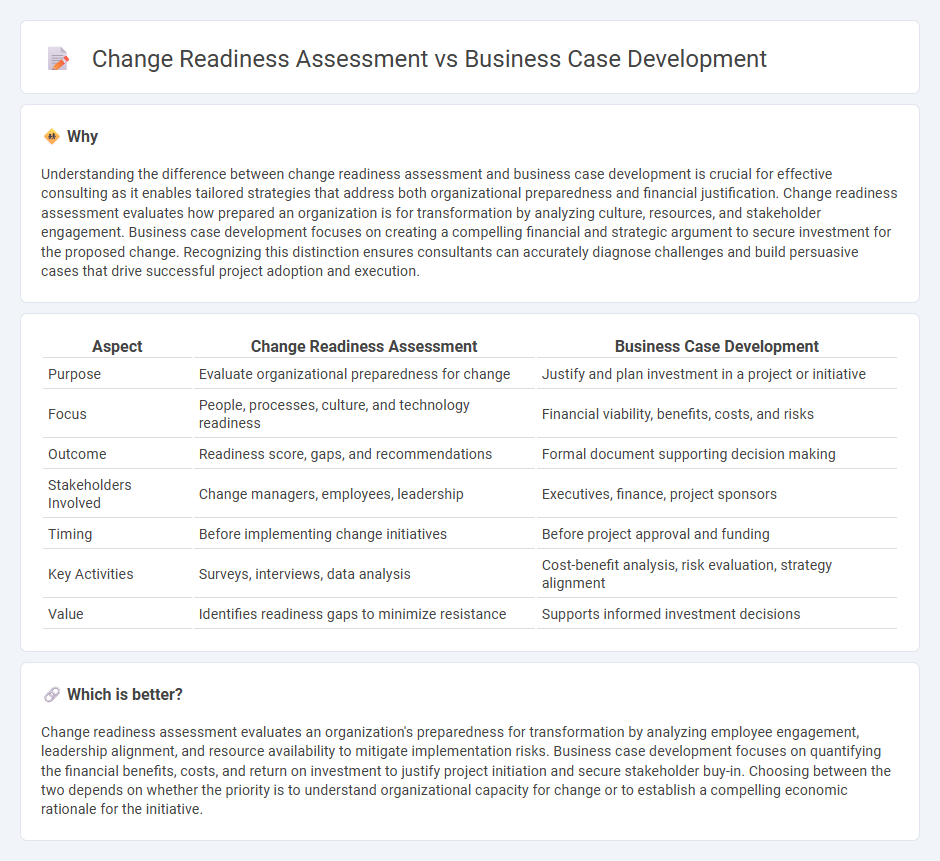
Change readiness assessment evaluates an organization's capacity to adapt to upcoming transformations by analyzing employee engagement, resource availability, and communication effectiveness. Business case development focuses on outlining the strategic, financial, and operational benefits of proposed initiatives, enabling informed decision-making and stakeholder buy-in. Explore how these critical consulting tools can drive successful organizational change and project approval.
Why it is important
Understanding the difference between change readiness assessment and business case development is crucial for effective consulting as it enables tailored strategies that address both organizational preparedness and financial justification. Change readiness assessment evaluates how prepared an organization is for transformation by analyzing culture, resources, and stakeholder engagement. Business case development focuses on creating a compelling financial and strategic argument to secure investment for the proposed change. Recognizing this distinction ensures consultants can accurately diagnose challenges and build persuasive cases that drive successful project adoption and execution.
Comparison Table
| Aspect | Change Readiness Assessment | Business Case Development |
|---|---|---|
| Purpose | Evaluate organizational preparedness for change | Justify and plan investment in a project or initiative |
| Focus | People, processes, culture, and technology readiness | Financial viability, benefits, costs, and risks |
| Outcome | Readiness score, gaps, and recommendations | Formal document supporting decision making |
| Stakeholders Involved | Change managers, employees, leadership | Executives, finance, project sponsors |
| Timing | Before implementing change initiatives | Before project approval and funding |
| Key Activities | Surveys, interviews, data analysis | Cost-benefit analysis, risk evaluation, strategy alignment |
| Value | Identifies readiness gaps to minimize resistance | Supports informed investment decisions |
Which is better?
Change readiness assessment evaluates an organization's preparedness for transformation by analyzing employee engagement, leadership alignment, and resource availability to mitigate implementation risks. Business case development focuses on quantifying the financial benefits, costs, and return on investment to justify project initiation and secure stakeholder buy-in. Choosing between the two depends on whether the priority is to understand organizational capacity for change or to establish a compelling economic rationale for the initiative.
Connection
Change readiness assessment evaluates an organization's preparedness for transformation, identifying potential risks and resource gaps. Business case development relies on this assessment data to justify investments by outlining benefits, costs, and strategic alignment. Together, they ensure informed decision-making and increase the likelihood of successful change implementation.
Key Terms
**Business Case Development:**
Business case development involves creating a detailed analysis that justifies a project or investment by outlining its benefits, costs, risks, and strategic alignment, serving as a foundation for decision-making and resource allocation. This process includes financial modeling, stakeholder analysis, and scenario planning to ensure a comprehensive evaluation of potential outcomes. Explore in-depth insights on how robust business case development can drive successful project approvals and organizational growth.
Cost-Benefit Analysis
Business case development centers on conducting a detailed Cost-Benefit Analysis to quantify and compare the financial implications of a project or initiative, ensuring informed investment decisions. Change readiness assessment evaluates the organization's preparedness, including stakeholders' ability and willingness, to effectively implement and sustain changes, which indirectly impacts cost efficiency and benefit realization. Explore further insights on how integrating these approaches can optimize project outcomes and financial performance.
ROI (Return on Investment)
Business case development emphasizes quantifying ROI by projecting financial benefits, costs, and risks to justify investments, using detailed financial models and performance metrics. Change readiness assessment evaluates organizational preparedness to implement changes, identifying potential barriers and enablers that impact ROI by influencing adoption rates and minimizing disruption costs. Explore deeper insights into aligning business case rigor with change readiness strategies to maximize return on investment.
Source and External Links
How to Write a Business Case (Example & Template Included) - A business case is a project management document that explains how the benefits of a project outweigh its costs and why it should be executed, starting by identifying the business problem and aligning it with organizational goals.
How to Write a Business Case: Template & Examples - A business case is developed early in a project outlining the why, what, how, and who necessary to decide if it is worthwhile continuing, detailing benefits, strategic fit, costs, and organizational impact to secure buy-in.
Five Steps to Develop a Solid Business Case with Examples - Developing a solid business case involves confirming the opportunity, analyzing options, evaluating risks and benefits, aligning with strategic plans, and providing a comprehensive budget and implementation approach.
 dowidth.com
dowidth.com